Emergency dental care during lockdown
By MAS Team
Out of 281 dentist chairs in the University of Otago's Faculty of Dentistry in the Clinical Services Building, the risk of COVID-19 transmission has meant that just two to four have been occupied at any time with patients during the lockdown.
Ministry of Health and Dental Council guidelines for alert level 3 and 4 stipulate dentists can't use drills. This technology generates considerable aerosol and greatly increases the risk of transmission. That means no fillings or root canals. Instead, dentists have only been able to treat trauma and undertake extractions when it's determined to be absolutely necessary.
Since late March, a team of about 40 dentists, dental assistants and administration staff have volunteered at the Faculty of Dentistry to meet the emergency dental needs of Dunedin residents, with a limited range of treatment options for about 12 patients a day.
Dunedin dentist Malcolm Dacker, a full-time professional practice fellow in undergraduate oral surgery at the Faculty of Dentistry and part-time general dental practitioner at Palmerston Dental Surgery, says there was no option than the the strict restrictions.
"Any oral health practitioners can understand why we can't pick up a drill which causes a huge aerosol at high-speed that's dealing directly where the virus comes out of – the mouth."
But this hasn't made it any less difficult for Malcolm and the other dentists involved to turn people away on the phone when they don't meet the treatment criteria, and having a lack of treatment options available for those who can be seen.
"It's not a nice thing to turn people away for stuff we'd usually treat them for. There are limits on what we can do and we talk to patients who aren't sore enough now coming back two weeks later and they've progressed to the point where the pain is not controllable."
"Most patients are very honest with their level of pain and infection and are very understanding if we can't treat them."
Malcolm says while there have been tough times, he is proud of the work they have done to keep the worst infectinos and trauma under control.
"We've dealt with this, on the whole, very well, making sure it hasn't gone out of control. We're in good spirits in the dental school. We're a tight team and we've been helping as much as we can and working well with each other under trying circumstances."
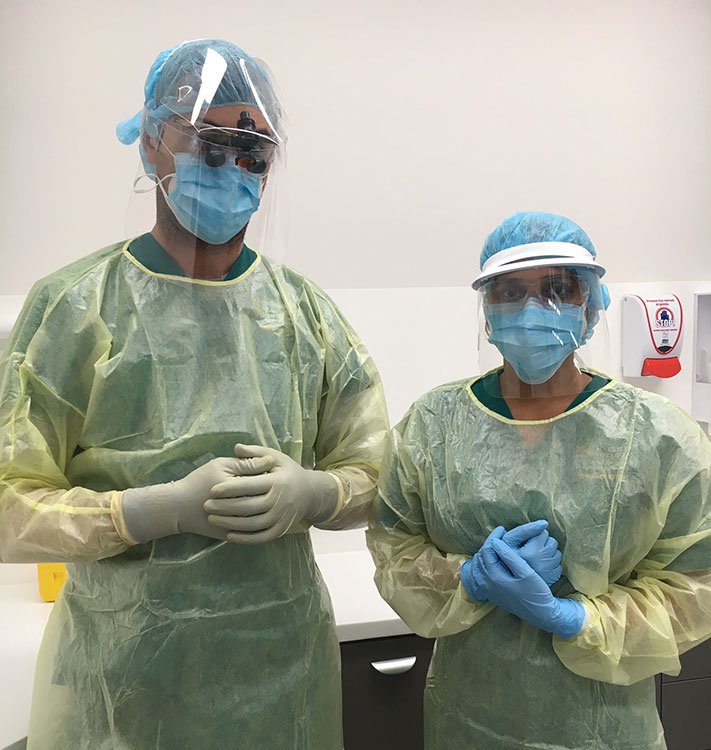
Malcolm Dacker and Dental Assistant, Bhavya Rajan.
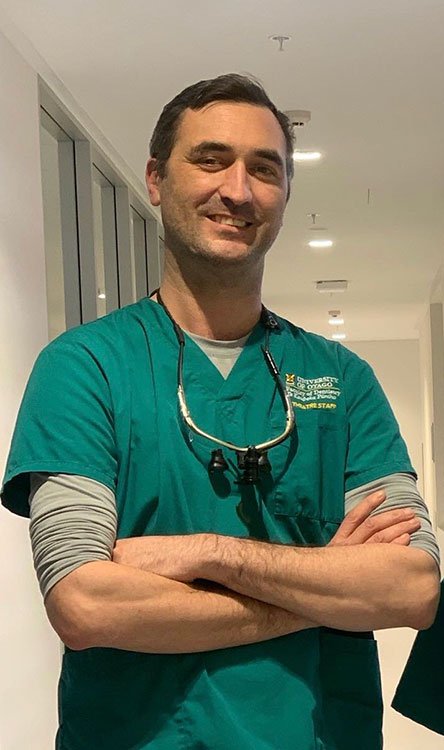
Malcolm Dacker
Establishing the clinic was possible thanks to the Faculty of Dentistry's good supply of PPE and enough dentists, dental assistants and administrators willing to volunteer to keep treating patients. Two dentists provide treatment in clinics, two dentists on the phone and a house surgeon is on call. Specialist dentists from all disciplines and maxillofacial consultants have made themselves available when needed. Dentists are working two to three-hour shifts.
The clinic has operated through a phone triage system. The patients first speak with an administrator and if suitable referred through to a dentist to determine their level of pain or trauma. If determined to be severe enough, they are booked in for a consultation or treatment. Otherwise, advice and prescriptions for antibiotics and pain relief are provided when needed.
The Faculty of Dentistry has also acquired a mobile dental clinic from the Southern District Health Board for treating confirmed COVID-19 patients, which they haven't yet needed to use. Malcolm has his fingers crossed they won't need to.
Early on there was concern about the safety of the dentists but ensuring a steady supply of PPE has helped allay the fears.
"We have N95 masks and face shields. We're wearing double gloves, double hats, double shoe covers, double masks. We're in those lovely banana suits, which are very hot – extremely hot."
The clinic will keep running as long as it's required and Malcolm says they're looking forward to being able to treat more patients with a wider range of treatments.
"We really feel for our patients. I haven't been working at my private practice for six weeks, which is an income stream that's lost to me. I've been working there for seven years and I've been triaging lots of my patients on the phone as many have needs which are not being met."
He's worried about the impact the lack of dental services during lockdown will have on the health of the wider population.
"The longer you leave something, the worse it gets. It's going to be full-on but we're looking forward to getting back to it. People need to smile, talk, eat and be pain-free," he says.
And as a dentistry tutor, he's also concerned about his students, who have lost crucial clinical time.
"The next generation of dentists have had lectures and tutorials on Zoom but they need to be putting their hands in people's mouths to learn."
We want to hear about what you've been doing to help those around you during the pandemic. If you'd like to share your story, email us at onmas@mas.co.nz.
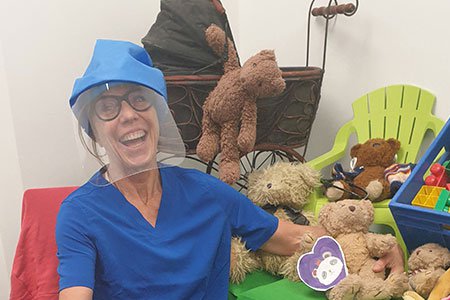
MAS is talking to Members about how COVID-19 has changed their work/life balance. First up is Christine Coulter from Team Medical in Paraparaumu.
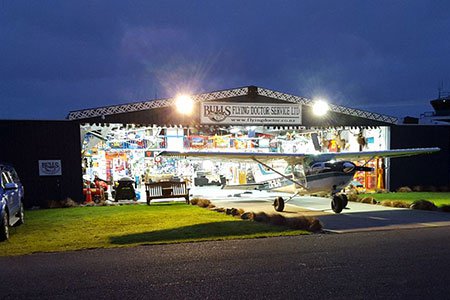
MAS Members are a generous bunch with many stepping in to help their neighbours, communities and and the country in the fight against COVID-19. Bulls flying doctor Dave Baldwin is one who put up his hand to help the effort.
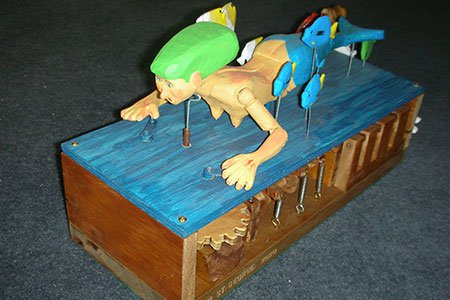
MAS is talking to Members about how they're spending their time under lockdown. Semi-retired GP Ian St George, has been creating kinetic sculptures in his shed.